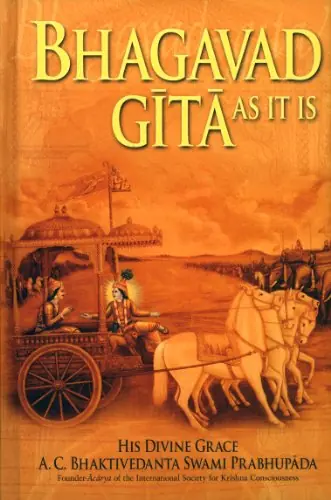
Inner Alchemy
⛩
Home
🔎
Search
🗂
Sequences
📡
Influence
📰
Articles
📚
Books
🎬
Videos
📝
Notes
👁
Dreams
📋
Glossary
📚
Friends & Mentors
📍
Playgrounds

Bhagavad-gītā As It Is
1968
This translation and commentary by Swami Prabhupāda, founder of the International Society for Krishna Consciousness (ISKCON), restores the Bhagavad-gītā to its devotional and initiatic essence.
Through Arjuna’s dialogue with Krishna on the battlefield of Kurukshetra, it unveils the timeless science of self-realization: how to act in the world without being bound by it.
Prabhupāda’s approach reclaims the text from purely philosophical readings by reintroducing its heart of devotion — Bhakti.
Krishna is not a symbol, but the Living Presence of the Divine guiding the human soul to remembrance through surrender, service, and love.
Every verse becomes a portal to the inner alignment of mind, heart, and action — the trinity of Yoga embodied.
Through Arjuna’s dialogue with Krishna on the battlefield of Kurukshetra, it unveils the timeless science of self-realization: how to act in the world without being bound by it.
Prabhupāda’s approach reclaims the text from purely philosophical readings by reintroducing its heart of devotion — Bhakti.
Krishna is not a symbol, but the Living Presence of the Divine guiding the human soul to remembrance through surrender, service, and love.
Every verse becomes a portal to the inner alignment of mind, heart, and action — the trinity of Yoga embodied.
Lineage Connection
This text stands as one of humanity’s most luminous bridges between East and West.
In your mandala, it represents the seed of the Christic current within the Indian tradition: the revelation that the Divine can incarnate, speak, and act through a human form.
Krishna’s call to Arjuna mirrors Christ’s invitation to the disciples — to stand, act, and serve from love rather than fear.
Within the Chi-Rho lineage, the Bhagavad-gītā As It Is embodies the Bhakti pillar: devotion as the highest intelligence, where action becomes offering.
It is the perfect counterpoint to I Am That (Jnana) — together they form the polarity Knowledge ↔ Love that later finds union in the Christic path.
In your mandala, it represents the seed of the Christic current within the Indian tradition: the revelation that the Divine can incarnate, speak, and act through a human form.
Krishna’s call to Arjuna mirrors Christ’s invitation to the disciples — to stand, act, and serve from love rather than fear.
Within the Chi-Rho lineage, the Bhagavad-gītā As It Is embodies the Bhakti pillar: devotion as the highest intelligence, where action becomes offering.
It is the perfect counterpoint to I Am That (Jnana) — together they form the polarity Knowledge ↔ Love that later finds union in the Christic path.
Author’s Roles / Archetypes
Modern transmitter of ancient devotion; restorer of divine intimacy; architect of accessible Bhakti consciousness for the modern age.
Primary Sources / References
• Original Sanskrit text of the Bhagavad-gītā (Mahabharata, Book VI)
• Commentaries by Ramanuja, Madhva, and other Vaishnava ācāryas
• ISKCON annotated edition (1972)
• Commentaries by Ramanuja, Madhva, and other Vaishnava ācāryas
• ISKCON annotated edition (1972)
Quotes / Notes
“You have a right to perform your duty, but not to the fruits of your actions.” — Bhagavad-gītā 2.47
“Whenever there is decline in righteousness, I manifest Myself age after age.” — 4.7
“Abandon all varieties of religion and simply surrender unto Me.” — 18.66
“Whenever there is decline in righteousness, I manifest Myself age after age.” — 4.7
“Abandon all varieties of religion and simply surrender unto Me.” — 18.66